Many people choose to make sleep a priority and find that they can do so by following a bedtime routine, exercising regularly, eating sleep-promoting foods, and relaxing before bed. However, there is a unique aspect of sleep hygiene that requires even extra attention. One that should be at the front of finding better sleep – is the sleep environment. You spend 1/3rd of your life sleeping in a bedroom. Too often, people oversee the importance of a bedroom sleeping well. Many of us use our bedrooms to watch TV, surf the Internet, chat with our spouses about life choices, and a variety of other non-sleep activities. If sleep is significant to you, it’s time to examine your bedroom’s effects on your sleep and ways to improve it.
Table of Contents
How to Maximize Your Bedroom to Sleep
1. Change the way you think about Bedroom
One of the essential keys to maximizing sleep efficiency in your bedroom is connecting your bedroom. Ideally, your bedroom should only use for two purposes: sleep and romance. Everything that done in your bedroom serves no other purpose than to distract you from rest. But how can you improve your bedroom so that it is only associated with sleep?
2. Clear up all the Mess
Watch TV in the bedroom: Your bedroom is not your gym, office, or playroom. To associate it with sleep, you need to eliminate all possible distractions. Move the treadmill to another, remove the computer and the desk, and drop the TV most importantly (and probably the most difficult). If you have your bedroom as a place for other activities, your brain only connects the room with other things. If your office is in your bedroom, it can be helpful to keep your thoughts busy and even worried about work when you combine the room with an active job.
Getting rid of the TV helps in several ways. On the one hand, it is too easy to see it before going to bed because it is in the bedroom. Some programs can keep your mind awake longer if you are drawn into the story. TVs also emit blue light, which can slow the body’s production of melatonin. Light is associated with vigilance. When it’s bright, your body doesn’t make as much melatonin, a hormone that promotes sleep and makes it difficult to fall asleep.
3. Throw away all Electronic Devices
Cell Phone in Bed For the same reasons that you shouldn’t have a TV or computer in your bedroom, you shouldn’t have a cell phone, tablet, laptop, handheld game console, or electronic player in the bedroom. Most of these devices also emit light that steals sleep and is used to consume content that can deprive you of sleep due to its appeal.
You should also change the position and location of your alarm clock. The light from the digital display is not only entertaining, but many people are continually looking at the time shown on their watches. When it’s late, worry about losing sleep. This fear of losing sleep can cause anxiety, which will lead to even more sleep loss. The top solution for alarm clocks is to set them to the specified wake time, place them around the room, and turn them away from you. It saves you from worrying about the weather and keeps you from falling asleep by pressing the snooze button, as you have to get up in the morning to turn it off.
4. Keep your Room Dark
We’ve already covered how artificial light mimics natural light to keep you awake. One of the best things for Sleep Environment is to turn off all possible lights. That is, don’t leave a lamp on, remove the night lights, and get heavy curtains or blackout blinds to turn off the lights from outside. If you refuse to take your phone out of the room, it helps to turn it over with your screen before bed. Many phones turn on when an incoming text, email, or push notification arrives from an app that can distract you from your sleep or even wake you up. Eliminate unwanted light at night by turning your phone over.
5. Keep your Room Quiet
Noise is another common dream thief. Whether the sound is coming from inside the room, from the hallway, or from across the street, noise can keep us from falling asleep and, worse, waking us up. In truth, it is not so much the sound itself that prevents sleep, but the inconsistency of the music or silence that can be harmful. If your sleep environment has noises beyond your control (see noisy neighbors and traffic), try sleeping with a sound machine. Sound devices produce soft, calming sounds that not only help you relax to sleep but also muffle other sounds that can wake you up.
Some people say they need music to Sleep Environment. If you can’t fall asleep without listening to music, try setting it to a timer to sound shortly after you usually fall asleep. It eliminates the chances of a sudden and inconsistent sound waking you up.
6. Keep your Room Cool
When you fall asleep, your body temperature begins to drop as you prepare to sleep. Keeping your room fresh (between 60 and 67 degrees) can help your body cool down. Sleeping naked not only increases your chances of sleeping soundly and comfortably, but it also helps cool your body by eliminating nightgowns and pajamas that can maintain body temperature.
7. Make your Bed Comfortable

Suppose you wake up feeling stiff, numb, or tired, or if you’ve just slept well in a hotel bed, it may be time to change your mattress and pillows. Almost all best mattresses are designed to last up to 12 years, but if your mattress has dents, snags, rips, or holes, you may want to consider replacing it. Similarly, if you continually inflate your pillow throughout the night, it might be time to get a new one.
You spend 1/3rd of your whole life for sleeping in your bed, and while the upfront costs of a new couch can be terrifying, it may be worth making the most of what you can afford. Choosing a mattress depends on your personal preference, whether you sleep better on a firm, inflatable, or slightly floating bed, there is a mattress to suit your needs.
Mattresses are available to meet all types of sleep needs, including adjustable stiffness, preferred sleeping positions, rocking/rocking discomfort, or even blankets if you have allergies to specific tissues or mites.
8. Paint your Room
You are painting your room. A study in Britain showed that the color of your bedroom could impact the number of hours you sleep. In a survey of over 2,000 UK households, the colors blue, yellow, and green found to help those who sleep the most hours, blue on average 7 hours 52 minutes, yellow 7 hours 40 minutes, and green 7 hours 36 minutes.
These colors are often associated with calm and relaxation and can help relax the mind when trying to rest. On the other end of the spectrum, colors like purple, brown, and gray can ruin the quality of sleep you get. The average hours for those colors are 6 hours 12 minutes for gray, 6 hours 5 minutes for brown, and 5 hours 56 minutes for purple.
Theories suggest purple is an artistic color that stimulates the creative mind, and browns and grays are often associated with sadness and depression. You can observe there are a lot of things that can rob you of sleep.
Fortunately, most of these problems can be resolved by adopting sound sleep hygiene and making it a priority. Unfortunately, for few people, practicing good sleep hygiene and improving their sleep environment doesn’t help them sleep better always. Many of those people suffer from sleeping disorders that must be diagnosed and treated from a sleep study.
Manage your Stress in Daily Routine
A racing mind could cause your sleepless nights. Stress has a bad impact on all aspects of our health, including our sleep. So, how can you calm a racing mind? Try to relax by focusing on something other than what is stressing or worrying you. Consider a pleasant recollection or repeat a soothing phrase.
To fall asleep, many Americans utilize over-the-counter sleep medications (melatonin or antihistamines). However, even over-the-counter medications do not always improve sleep in the long run. In fact, using medications on a regular basis can reduce the quality of your sleep. Try to address the source of your stress and consult with your doctor if you are still unable to sleep properly or for long enough.


